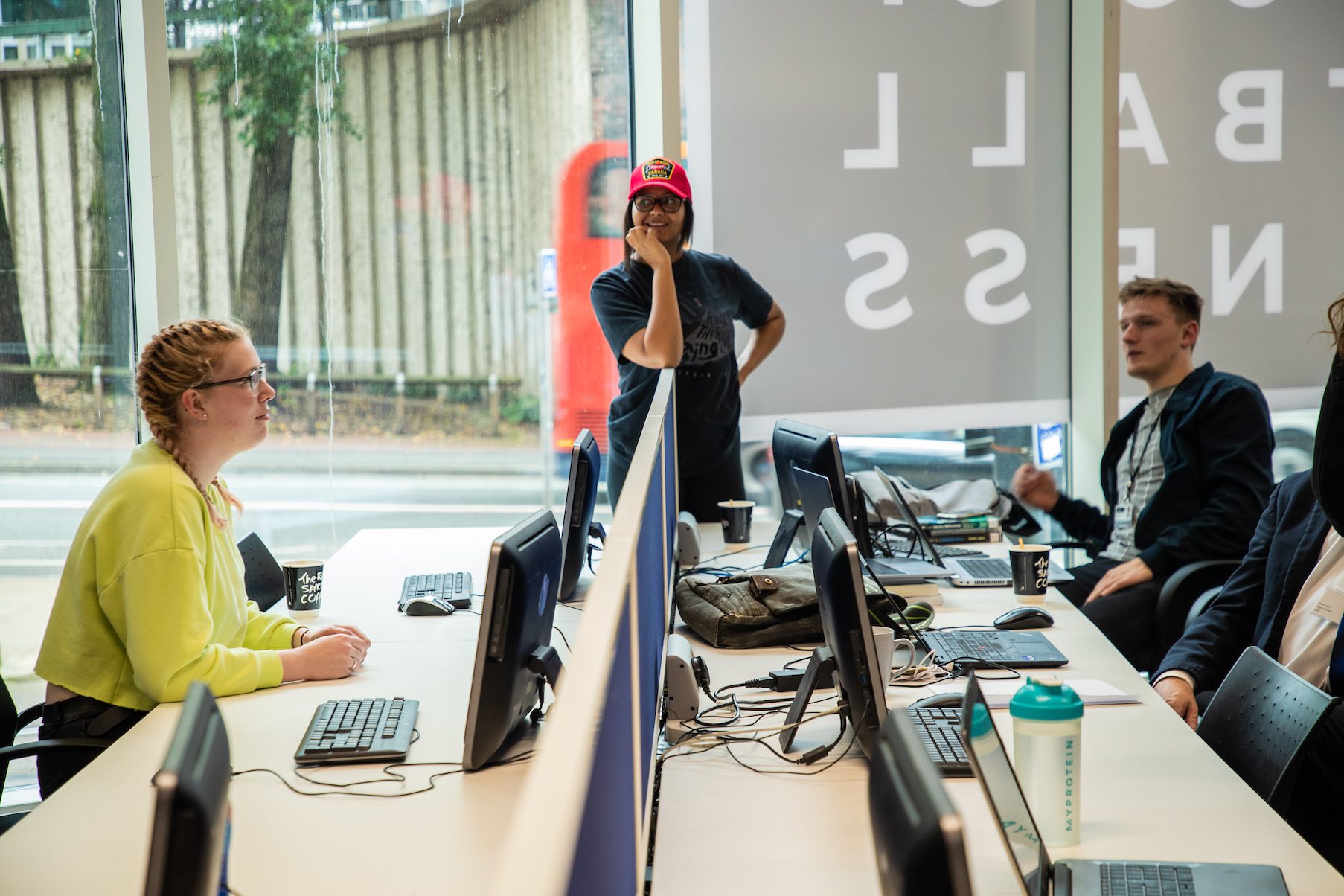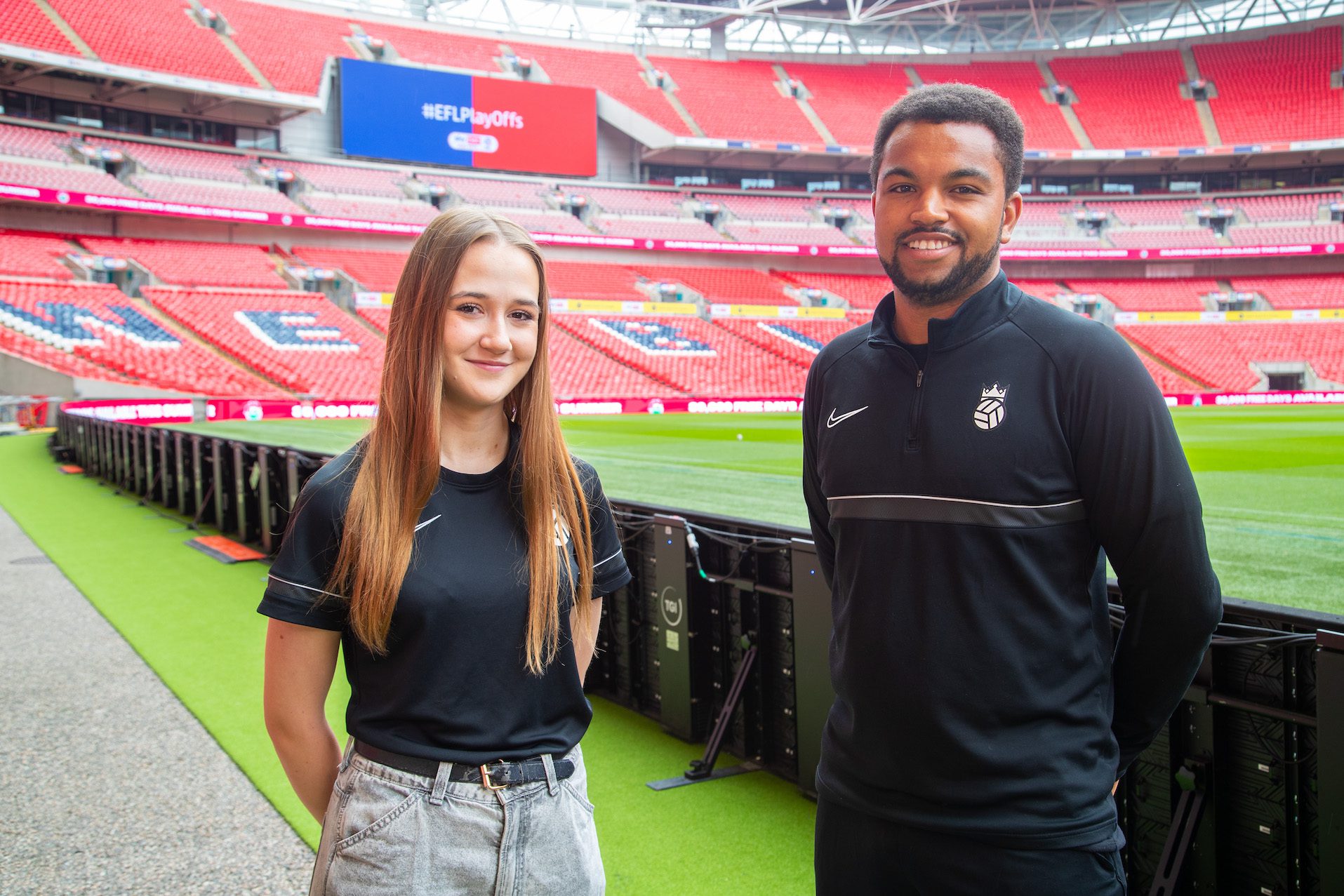
Why Football Business and Media?
Want to learn more about the media industry and business of football clubs and organisations? Vastly expanding media revenue, like ever-increasing TV Rights deals, sponsorship and commercial growth has led to in-demand opportunities for professionals across the media and business industry in football.

UCAS Information
Institution:
U10UCAS Course Code:
FM10Entry Criteria:
96 PointsAttendance:
Full TimeStart Dates:
SeptemberDuration:
3 YearsInstitution:
U10UCAS Course Code:
FM1FEntry Criteria:
64 PointsAttendance:
Full TimeStart Dates:
SeptemberDuration:
4 YearsWhat you’ll study
Course Overview
On this degree course you will explore facets of media communications and develop understanding of the relationships between industry stakeholders. You will also gain contextual insight into how public relations and journalism relate to the business of sport.
UCFB brings senior figures from organisations such as Sky, BBC, ITV, talkSPORT and governing bodies to work with our students and provide them with important insights in to how the media really works in order to supplement the teachings from UCFB’s own industry professionals and experienced media academics.

Course Content
The media pathways explore the many facets of media communications and develop your understanding of the interconnected relationship between industry stakeholders.
You will also gain an understanding of football business and media by introducing international football business models and management concepts, business planning, contemporary issues and public relations events strategy. There will be opportunities to develop your practical application of how football brands communicate to their audiences through PR related activity.
Studying at UCFB comes with a number of valued benefits to enhance your career and employment opportunities through our Employability and Career Planning provision.

Seminars

Networking

Guest Speaker sessions
Modules
University Campus of Football Business is an embedded college of the University of East London. All graduates will receive a degree from the University of East London.

This module will discuss how the media has changed the way sport – and especially football – is watched and played, with particular focus on broadcasting deals and the introduction of technology into sport to make it a more entertaining spectacle. You will also discuss the concepts of mediation, commodification and globalisation and their impact on football and other sports, as well as the influence of major conglomerates such as Disney and their move into the sports broadcasting arena. The role of the media in influencing decision making in top-flight sport will be examined – with focus on the England football manager’s role – as will other issues in football and sport that regularly make the headlines. The rise of social media and its effect on the way fans and customers interact with football and sport is also an important topic in this module.
20 credits
The business of football is a constantly evolving global industry because of its increased popularity and revenue streams. Football has a unique role in society, it transcends sport, leisure and entertainment and this distinguishes the football business from other industries. The module will provide you with an understanding of sports business models, concepts and theories in respect of the football industry. You will explore the sports business ecosystem which reflects key stakeholders and their realms of influence and interaction.
20 credits
In order for you to achieve your university and future workplace goals, you need to be aware of a number of personal qualities and behaviours that can impact your ability to succeed. It is also important that you understand the industry and societal context in which you plan to work. This module aims to introduce you to personal and professional factors relevant to employment in the sport industry, and to enhance your awareness of the industrial landscape. Additionally, it will support you in developing some essential academic skills for higher education (such as academic writing and referencing). The module will introduce you to a wide range of perspectives, philosophies, and principles of critical and ethical thinking which will equip you with the competencies and confidence to achieve your academic and employability goals.
20 credits
The sports industry does not exist in a vacuum. Rather, it is an environment which cuts across much of wider society, including politics, media, and popular culture. This module, drawing both on historical and contemporary examples, will explore the place of sport within the wider world. The module will aim to develop your academic understanding of the growth of sports within wider historical and theoretical frameworks, and how those frameworks continue to shape the present sports and media industries. The module will introduce a wide range of academic concepts, principles and case studies that will equip with a greater understanding and appreciation of the cultural significances of sport, past and present.
20 credits
With the emphasis on employability this module teaches you the culture and disciplines of the industry workplace in modern broadcast media while acquiring the skills required for Level 5. There is an introduction to current broadcasting technique and key to that is teaching journalistic principles on the way news operates, working in a deadline-driven industry, how to identify a story and how to tell those stories with audio and video. Our core teaching includes basic broadcast writing, interviewing and editing techniques, as well as learning pre-production skills vital in sourcing interviews. The whole process of how newsgathering develops into production will be a core concept. It is a module that will adapt to current trends in broadcasting for social media and embeds mobile journalism into your learning.
20 credits
Digital media is a fundamental part of the sport business landscape; a key stakeholder that looks set to define much of the industry’s future. This module combines theoretical and practical components to review key elements of the business of producing and consuming digital media. This module will introduce you to the academic and theoretical underpinnings of digital media business, and how these manifest themselves within the industry. This module will also allow you to put those ideas into practice through practical sessions dedicated to producing sports media content that would be competitive in an everchanging business environment.
20 credits
Working with digital platforms is now a core part of a journalist’s work. This module will explore new digital opportunities which have emerged for journalists in the 21st Century, while assessing the changing communication environment which has seen the emergence of different journalism models. You will learn how to tell stories using many different platforms, programs and techniques. As part of this module, you will develop those journalism skills acquired in the first year of study, applying them using the latest digital technologies, such as mobile journalism and podcasting. This module will adapt with trending technologies, teaching you the skills of story-telling through different platforms. You will learn how to operate industry-standard equipment and editing software. It is vital as multimedia sports journalists that you are able to research, write, record and edit your own content. Storytelling within multimedia sports journalism is powerful and can shape public opinion, but with that comes ethical and intellectual responsibility. You will also analyse and apply some of the techniques of digital journalism, such as the use of analytics in tracking audience engagement, and maximising the reach of stories.
20 credits
This module covers the topics of media law and ethics, and how they control and influence the work of journalists and the media, with specific reference to the sports media and football. As digital technology increasingly affects both the speed of news delivery across a range of platforms, so too does the scrutiny of media behaviour. Privacy and defamation have become key elements of media law and ethics. You will learn how diverse the coverage of sport activity is used to entice audiences, entertain, promote, market and sell, and how it is used in launching and creating specialist media sectors. You will learn about the legal and ethical framework within which a sports journalist must operate, taking into account OFCOM regulation and the Editors’ Code of Practice.
20 credits
Following on from your previous training regarding personal qualities and behaviours that can impact your ability to succeed, this module focuses on developing your practical skills relevant to a workplace environment. This module will ask you to apply your knowledge and personal skillset to problem-based learning scenarios, and live projects. You will learn project management skills, develop your personal pragmatism, and enhance your industry-based interests and understanding. You will work both as part of a team and independently, developing essential aspects of your emotional, social, and professional self.
20 credits
As a practitioner in your discipline you will be required to engage in evidence-based practice. This module supports your ability to become an evidence-based practitioner by providing you with an introduction to the processes involved in conducting research within your discipline and equipping you with the skills and knowledge to be able to critically analyse the work of others. This module will build on skills and knowledge which you will have acquired throughout your course so far, and has been designed to prepare you for conducting your own independent project as part of the Professional Project module at Level 6. Specifically, this module will enable you to gain an applied understanding of the research process. This will involve identifying a contemporary industry-relevant issue; developing project aims and objectives; understanding reflexivity and the role you play in the design and execution of a project; understanding methodologies and different methods of data collection, analysis, and interpretation; and appreciating the importance of ethical practice. The delivery of this module will be facilitated by your engagement in a research project to investigate contemporary industry-relevant issues.
20 credits
This module investigates the importance of Public Relations (PR) in brand protection and corporate communication, with an emphasis on its relevance to the world of football and sport. You will analyse the concepts and theories of public relations and discuss how sports clubs and organisations use these to promote and protect their brand, and also assess how social media has impacted on this. You will analyse the growth in and importance of corporate social responsibility, with emphasis on how this is used in the football industry to promote brand awareness. You will be assessed both academically and practically, with a written assignment and the creation of a ‘real-world’ PR strategy.
20 credits
This module focuses on television studio production. You will build a first-hand understanding of how this vital sector of the sport broadcasting industry operates by producing original television studio content as part of a production team displaying employable skills in storytelling, production technique and teamwork. You will create sophisticated TV sports-news content, learning how to develop, film, write, present and narrate and edit their own story ideas. This module will help you to understand the way multi-skilled broadcasting works in the industry today – with the emphasis on a deadline-driven environment. You will bring your knowledge of content creation into the TV studio working in teams, although you will be assessed individually. Your sports-news packages will be adapted and updated for use in a TV studio show where you will learn pre-production, live and post-production skills. Team-working will be essential to fulfil individual roles as presenter, producer, reporter, floor manager, autocue operator, scriptwriter, editor, director and vision mixer.
20 credits
In this module, you will evaluate how branding concepts are conveyed to markets, with football being central to this. You will be encouraged to debate the applicability of these arguments to football clubs and how they can be implemented to fulfil sporting goals. The increased accession of player branding is a further consideration of this module. You will develop and apply branding strategies for sporting entities which will contribute to and align with the wider marketing strategy of such institutions and individuals.
20 credits
This module investigates the importance of crisis management in the age of social media and how this relates to image protection in the football industry.
You will analyse the concepts and theories of Public Relations in relation to crisis management and the importance of brand protection in the football industry.
You will investigate issues and threats to organisational image and reputation and how social media impacts on the relationship between the organisation and stakeholders. It also fits in with and builds on the concepts and theories being investigated in other modules on the programme. You are assessed both academically and practically, with a written assignment and the creation of a ‘real-world’ crisis management plan based on case studies.
20 credits
The sports business and sports media environments continues to evolve at a remarkable pace, with digital technologies at the heart of this continuing change. As a sports business professional, critically evaluating and deconstructing the nature of these changes, and what the future holds for the industry, is of fundamental importance. This module, as a Level 6 academic module, aims to drive forward your analytical skills and develop you for an industry that refuses to stand still. This module will explore a wide range of philosophies and theory related to various ‘futures’ for the sports industry which will equip you with advanced levels of understanding, competency, and confidence to enter a variety of digital futures.
20 credits
This module provides you with the opportunity to synthesise the knowledge and skills you will have developed during the course of your studies and independently design, develop and execute an individual professional project. This project aims to investigate an original contemporary industry-relevant issue and will be a platform through which you will demonstrate the knowledge, skills, understanding and expertise you have developed in your discipline thus far. It is expected that your project output will contribute to industry practice and/or academic and practitioner knowledge. To achieve this, you will investigate an original contemporary industry-relevant issue and make judgments on the basis of sound evidence and therefore, the project will be research- and inquiry-based. The project will be directly relevant to your course and will be produced and disseminated in the format best suited to the project aims and to developing a career of your choice. The project will build on the L5 Research Methods assessment and you will be working closely with a project supervisor who will provide guidance and support throughout your project.
40 credits
Following on from your previous training regarding personal qualities and behaviours that can impact your ability to succeed, this module focuses on practical application of that knowledge during a workplace visit. Until now, your modules have provided learning opportunities about the industry and societal context in which you plan to work. This module aims to introduce you to a workplace environment. Doing so will allow you to enhance your awareness of the industrial landscape through experience. This module creates a space for you to apply competencies developed in your modules to date to a real-life setting, leading to experiential and reflective learning.
20 credits
This module will provide you with the opportunity to identify the skills, competencies and experience required for successful development to embarking on their university degree and successfully completing it and progressing on to a range of potential future career areas. Central to the developmental process is for you to cultivate the reflective skills, openness and self- awareness to enable you to assess what you are doing, identify areas for improvement, and confidently receive and give constructive feedback.
20 credits
This module will provide you with the opportunity to identify the skills, competencies and experience required for employment. This will support you in your ‘transition’ from school, college or the work place towards degree level study. You will begin to recognise the areas for your own personal professional development (including emotional, social, physical, cultural and cognitive intelligences) through taught and workshop activities. This will allow you identify attributes that are important to develop that are important for your career in the sports professional related to your programme.
20 credits
The module will introduce you to the research processes when undertaking a project within your field of study. You will explore the important ethical considerations when planning and conducting a research project safely to analyse a problem or question specific to your subject area. This will require you to utilise and apply key research skills alongside selecting appropriate methods to collect data and report significant findings regarding your research question.
20 credits
This module introduces you to many of the challenging and complex contemporary issues faced in the rapidlychanging and demanding, world of sport. It will allow you to build and consolidate knowledge, through understanding of key issues within the broad arena of sport in a discursive manner that will underpin your future work. You will be encouraged to research events, themes and issues that have affected the world of sport and, in some cases, changed the structure and behaviour of the sports industry.
20 credits
The module will provide you with the foundations of a range of concepts, models and practical skills related to the sports media industry. This module will introduce you to the basic skills, roles and responsibilities of the media. The module enables you to examine the development and growth of the media industry within society and the contemporary issues related to the media environment, developing group work skills and information acquisition in preparation for the delivery of presentations using appropriate spoken language and terminology.
20 credits
This module provides you with an introduction to the application of media law and ethics within the field of sports media and journalism. You will begin to identify the legal and ethical framework within which a sports journalist must operate (IPSO, OFCOM and ethics). You will begin to discuss media is applied to sport across a range of media platforms (including print, broadcast and online). You will begin to review how new technologies are used in, and impact upon, today’s media industry with a practical application. You will begin to develop your knowledge of the demands of the digital age to work professionally in the sector.
20 credits
Shaun Barry
Guest Speaker
Manager of Content Services at Sky

Get to Know Your
Course Leaders
Understanding your
Entry Requirements
University Campus of Football Business is an embedded college of the University of East London. All graduates will receive a degree from the University of East London.
For further information on entry requirements, contact our Admissions Team at admissions@ucfb.com.
Academic Entry Requirements
96 UCAS tariff points or equivalent non-tariff qualifications.
GCSE Maths and English Language (Grade C/4 or above) or equivalent e.g. Functional Skills Level 2.
International applicants will be asked to pass the Academic IELTS test with a minimum overall score of 6.0 and no less than 5.5 in each of the four elements.
All applications are reviewed on a case by case basis. If your academic achievements do not meet the minimum level required but you have considerable professional experience, please contact admissions@ucfb.com.
International
Please be aware that all applicants who do not hold British or Irish nationality will require a visa to study in the UK. Our access to a UK Government Student Visa licence is currently being reviewed. This means we are unable to consider applications from any applicant who would require a student visa to study in the UK as we cannot issue a Confirmation of Acceptance for Studies (CAS).
If you are unsure whether you would need a visa to study in the UK, or for more information, please contact admissions@ucfb.com.
Advanced Entry
We accept applications with advanced standing via our Advanced Prior Learning (APL) application process. Should you wish to apply for direct entry into Year 2 or Year 3 of one of our undergraduate degree programmes, you will be required to complete an APL application form and provide us with evidence of your previous studies.
Please contact admissions@ucfb.com for further detailed guidance. Please note that should you wish to apply via this process, we strongly encourage you to begin the application process early in the cycle and you will still be required to complete a UCAS application.
Academic Entry Requirements
64 UCAS tariff points or equivalent non-tariff qualifications.
GCSE Maths and English Language (Grade C/4 or above) or equivalent e.g. Functional Skills Level 2.
International applicants will be asked to pass the Academic IELTS test with a minimum overall score of 6.0 and no less than 5.5 in each of the four elements.
All applications are reviewed on a case by case basis. If your academic achievements do not meet the minimum level required but you have considerable professional experience, please contact admissions@ucfb.com.
International
Please be aware that all applicants who do not hold British or Irish nationality will require a visa to study in the UK. Our access to a UK Government Student Visa licence is currently being reviewed. This means we are unable to consider applications from any applicant who would require a student visa to study in the UK as we cannot issue a Confirmation of Acceptance for Studies (CAS).
If you are unsure whether you would need a visa to study in the UK, or for more information, please contact admissions@ucfb.com.
All applications for an undergraduate degree course are submitted via UCAS. To apply, please visit UCAS.com.
Enhance your
Career Prospects
This degree provides UCFB students with an insight into how public relations and media relate to the business of football and the wider sports industry with career opportunities as wide and varied as media and marketing manager, digital media executive, social media strategist, football data analyst and match day commentator. Graduates have the ability to rise to senior managerial roles due to the management aspect of the degree.
Graduates of the BA (Hons) Football Business and Media degree have gone on to work in roles for organisations such as:
- talkSPORT – Journalist
- EFL – Social Media Manager
- Liverpool FC – Senior Partnership Operations Executive
- Manchester City – Business Development Manager
- ITV Sport – Researcher
- Fulham FC – Social Media and Content Executive
- Premier League Productions IMG – Production Coordinator
- The FA – Media Operations Assistant
93 %
Of UCFB graduates find full-time employment within 6-9 months of graduating
96 %
Of UCFB Graduates are working in highly skilled paid jobs.
Get to know our
Course Alumni
of UCFB graduates are in employment within six months of graduating and almost two-thirds of them work within the global sports industry.
Employability and Career Planning
At UCFB we bridge the gap between education and business, allowing a unique approach to education. We provide two curricula; the academic curriculum which encompasses exams and coursework and the Employability and Career Planning programme – a three year journey of professional and personal development.
This provides access to best-in-class industry guest speakers, additional qualifications and exceptional opportunities to apply for work experience placements to ensure our students graduate as well-rounded, empowered professionals.


































